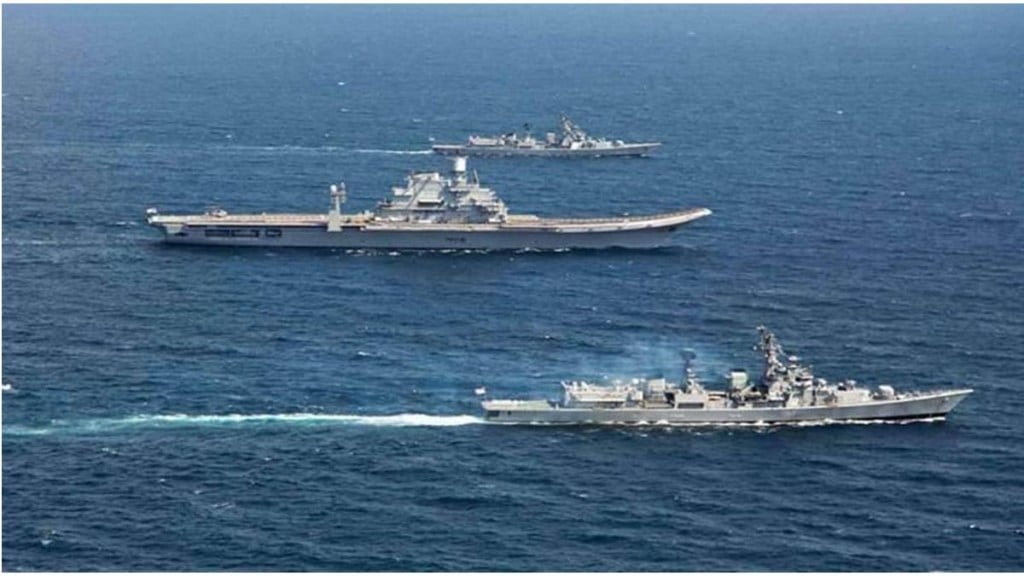For maritime security in the Persian/Arabian Gulf Region, four West Asian countries including Iran, Saudi Arabia, UAE and Oman are holding discussions amongst themselves to form a joint navy. The consultations brokered by China is expected to lead to formation of a joint navy which will guarantee maritime security. These consultations come close on the heels of the recent landmark Iran-Saudi normalization agreement which was brokered by Beijing.
Significance
The Persian Gulf region, according to information in the public domain holds over half of the world’s crude oil reserves as well as a considerable portion of the world’s natural gas reserves. It is also a producer of almost one third of the world’s oil.
The call to form a joint navy has been initiated by Iran which has reached out to these three countries to take part in establishing a joint navy as it is critical for the region.
With the aim of ensuring the safety of navigation in the Persian Gulf, Iran has called on these Gulf countries to participate in the formation of the joint naval force. These countries have come forward and talks have started with the help of China.
Almost two months ago, the UAE withdrew its participation in the US led 38 nation Combined Maritime Forces which was tasked with securing tense Gulf waterways that are critical to the global oil trade.
Background of CMF
The Headquarters of CMF which was established in 2001 is located in Bahrain. Initially there were 12 countries and now more countries have joined CMF. It is active in the Gulf waters where oil tankers move and have been attacked in recent months.
View of an expert
“Actually, Iran has been pressing for these kinds of arrangements for a long time, saying local solutions and getting rid of US/external powers. With the US no longer forthcoming to Saudi-Emirati needs, they have become more receptive. Oman was always inclined to balance ties between Iran and the West,” Md. Muddassir Quamar, Ph.D., Associate Professor, Centre for West Asian Studies, School of International Studies, JNU, explains to Financial Express Online.
According to him, “People had so far explained it as hedging, but for me there are signs of balancing now. It has gone beyond hedging, the underlying thought is that the world is heading towards a post-American hegemony, and hence regional countries need to adjust.”
“And unlike in other parts of the world, especially South and Southeast Asia, China is not a divisive actor in West Asia or the Gulf. Earlier it was a benign actor, now it is becoming a unifying actor which means more distancing from the US-led order might be on the cards,” Md. Muddassir Quamar, author of Education System in Saudi Arabia: Of Change and Reforms.
About Iran related incidents
It has been reported earlier in a section of the media that Iran had seized two tankers in late April and early May. Following these incidents the US is quoted as saying that reinforcements are being sent to the Gulf. In November 2022 Iran was also accused of launching a drone attack against an Israeli-owned tanker. This stoked tensions with the US.
Though no details or specific objectives of this collaboration are known yet, the prospect of Iran, Oman, UAE and Saudi Arabia getting together in the region to protect the waters carries significant implications for regional dynamics.
What could be the potential impact?
According to maritime security experts, such a move could have an impact on regional security, geopolitical balance, and the interests of external powers in the region.
Regional Security
A joint navy among these countries could have mixed effects on regional security. On one hand, it may enhance maritime security by enabling coordinated efforts against common threats such as piracy, smuggling, or terrorism. Also information sharing and joint patrols, which would help in the stability of the vital sea routes in the Gulf of Oman and Persian Gulf.
However, if there are tensions or disputes among the four countries it would aggravate regional rivalries and possibly lead to conflicts in the maritime domain.
Geopolitical Balance
It could potentially impact the existing geopolitical balance in the region and might strengthen the collective influence of these countries. This could lead to shifts in power dynamics and influence the behaviour of other regional actors.
Regional Cooperation and Dialogue
While the formation of a joint navy may reflect the intentions of the four countries to enhance their naval capabilities, it is essential for regional cooperation and dialogue to be pursued simultaneously. Engaging in constructive dialogue, confidence-building measures, and dispute resolution mechanisms can help mitigate potential tensions and foster trust among regional actors. Emphasizing the principles of transparency, non-aggression, and respect for international law can contribute to a more stable and secure West Asia region.

